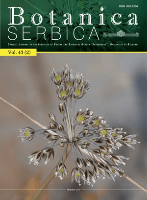
Botanica Serbica
Scope & Guideline
Fostering innovation in botanical studies since 2009.
Introduction
Aims and Scopes
- Taxonomy and Systematics:
The journal publishes papers that contribute to the classification and identification of plant, algae, and fungi species, often highlighting new records and taxonomic revisions. - Ecological Studies:
Research focusing on the ecological relationships and habitat preferences of various botanical species, addressing issues like distribution patterns and environmental impacts. - Phytochemistry and Biological Activity:
Papers exploring the chemical composition of plants and their biological activities, including antimicrobial, antioxidant, and cytotoxic properties, often emphasizing the practical applications of these findings. - Conservation and Biodiversity:
The journal addresses conservation efforts and biodiversity assessments, particularly concerning endemic and rare species in Southeast Europe. - Physiological and Molecular Responses:
Studies on the physiological and molecular responses of plants to abiotic stresses, such as salinity, drought, and metal toxicity, are a significant focus, illustrating the adaptive mechanisms of various species.
Trending and Emerging
- Molecular Phylogenetics:
There is an increasing trend towards using molecular techniques to understand phylogenetic relationships among plant species, highlighting the relevance of genetic data in taxonomy and conservation. - Environmental Stress Responses:
Research focusing on how plants respond to various environmental stressors such as salinity, drought, and heavy metal toxicity is gaining traction, reflecting global concerns over climate change and habitat degradation. - Bioactive Compounds and Their Applications:
A significant rise in studies exploring the bioactive compounds of plants and their potential applications in medicine and agriculture has been observed, showcasing the relevance of phytochemistry in contemporary research. - In Vitro Cultivation Techniques:
There is a growing interest in the optimization of in vitro cultivation methods for rare and economically important plant species, emphasizing conservation and sustainable use. - Regional Flora Assessments:
Research dedicated to documenting and assessing the flora of specific regions within Southeast Europe is increasingly prominent, contributing to biodiversity knowledge and conservation efforts.
Declining or Waning
- Traditional Ethnobotany:
While ethnobotanical studies have been a part of the journal's history, recent publications show a decline in this theme, suggesting a potential shift towards more experimental and molecular approaches in botanical research. - Invasive Species Studies:
Research specifically focusing on invasive species has diminished, which may indicate a transition to broader ecological studies rather than a concentrated focus on invasives. - Historical Botanical Surveys:
Papers that document historical botanical surveys or collections are becoming less frequent, possibly overshadowed by studies emphasizing contemporary ecological assessments and molecular techniques.
Similar Journals
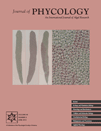
JOURNAL OF PHYCOLOGY
Fostering Innovation in Algal StudiesJOURNAL OF PHYCOLOGY, published by Wiley, is a premier academic journal dedicated to the realms of Aquatic Science and Plant Science. Established in 1965, it has continuously contributed to the advancement of phycology through rigorous research and scholarly discussions. The journal holds an impressive reputation, classified as Q1 in both aquatic and plant sciences for 2023, affirming its position among the top-tier journals in these fields. With a Scopus ranking of 31 out of 247 in Aquatic Science and 75 out of 516 in Plant Science, it stands in the 87th and 85th percentiles respectively, highlighting its influence and impact. While it is not an open access journal, it offers a wealth of valuable insights and original research articles that are essential for researchers, professionals, and students alike. The JOURNAL OF PHYCOLOGY is a critical platform for the dissemination of knowledge on both fundamental and applied aspects of algae, making it indispensable for those who seek to deepen their understanding of this crucial area of biological science.

Annali di Botanica
Empowering global collaboration in botanical research.Annali di Botanica is a distinguished journal published by UNIV STUDI ROMA LA SAPIENZA that has become a vital platform for advancing research in the field of plant sciences. With its Open Access policy established since 1995, it ensures that a wide audience including researchers, professionals, and students can access high-quality, peer-reviewed articles that contribute to the global body of botanical knowledge. As of 2023, the journal holds a Q3 rank in the Plant Science category, reflecting its commitment to scholarly excellence and relevance, as evidenced by its position within the 62nd percentile of activities ranked in Scopus. The journal encompasses diverse topics in botany, fostering discussions that encompass morphological, ecological, and genetic aspects of plants, effectively bridging theoretical knowledge and practical applications. Situated in the heart of Rome, Italy, at PIAZZALE ALDO MORO, 5, the journal not only addresses regional botanical issues but aims to serve a global audience, enhancing collaborative efforts and stimulating innovation across the botanical sciences.
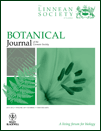
BOTANICAL JOURNAL OF THE LINNEAN SOCIETY
Unveiling the Complexity of Flora and Fauna InteractionsThe Botanical Journal of the Linnean Society, published by Oxford University Press, stands as a premier platform for interdisciplinary research within the realms of Ecology, Evolution, Behavior, and Plant Science. With a notable impact factor reflective of its esteemed reputation, this journal is classified in the Q1 quartile for both Ecology and Plant Science, placing it among the most influential publications in these fields. Since its inception in 1969, and with an anticipated convergence of research extending to 2024, it has become essential for scholars and professionals seeking to engage with cutting-edge studies, theoretical frameworks, and practical applications that drive our understanding of plant biology and ecological systems. The journal’s commitment to excellence is underscored by its robust Scopus rankings—achieving an impressive 83rd percentile in Ecology and a 82nd percentile in Plant Science. This makes the Botanical Journal of the Linnean Society a crucial resource for researchers, educators, and students alike, eager to advance their knowledge and contribute to the evolving discourse in botany and environmental studies.
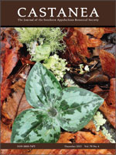
CASTANEA
Nurturing Knowledge in Plant Conservation and ResearchCASTANEA is a distinguished journal published by the SOUTHERN APPALACHIAN BOTANICAL SOCIETY in affiliation with NEWBERRY COLLEGE. With an ISSN of 0008-7475 and an E-ISSN of 1938-4386, this esteemed publication serves as a vital platform for researchers and practitioners in the field of Plant Science. It has been circulating since 1982, and its scope focuses on the study of trees, their ecology, and conservation, thereby contributing significant insights into the biodiversity of the Southern Appalachian region and beyond. Despite its current ranking in the Q4 quartile and the 5th percentile in the Scopus Agricultural and Biological Sciences category, CASTANEA is committed to advancing knowledge and fostering a deeper understanding of plant sciences among academics and students alike. The journal does not currently offer Open Access options, maintaining a traditional subscription model that allows for carefully curated and peer-reviewed content. As you explore the advances in plant biology through CASTANEA, you will find an invaluable resource that supports both emerging and established scholars in their research endeavors.

BRITTONIA
Unveiling Nature's Secrets: A Journey Through Plant SciencesBRITTONIA, published by Springer, stands as a reputable journal dedicated to advancing the fields of botany and plant sciences. With a storied history dating back to 1931, this journal has evolved to embrace contemporary research spanning various aspects of plant biology, ecology, and systematics. Focusing on a comprehensive analysis of both ecological interactions and plant systematics, BRITTONIA plays a crucial role in disseminating knowledge among researchers and professionals committed to understanding plant life and its environmental contexts. Despite its open access status being currently unavailable, the journal ensures wide accessibility through institutional subscriptions. In the latest rankings, it proudly holds a Q2 category in Plant Science and a Q3 category in Ecology, Evolution, Behavior, and Systematics, indicating its growing influence and academic rigor. Researchers and students alike will find BRITTONIA an essential resource for the latest findings and discussions in plant sciences.
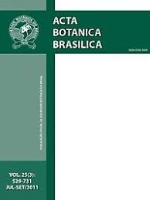
Acta Botanica Brasilica
Unlocking the Secrets of Plant DiversityActa Botanica Brasilica is a prestigious open-access journal dedicated to the field of botany and plant science, published by SOC BOTANICA BRASIL. With an ISSN of 0102-3306 and E-ISSN of 1677-941X, it has been a vital resource for the academic community since its inception in 1987, fostering the dissemination of research and knowledge related to plant biology and ecology. Hailing from Brazil, the journal serves as a platform for researchers to share valuable insights on plant species, their habitats, and important ecological interactions. As of 2023, the journal holds a Q3 ranking in Plant Science and is recognized within the Scopus database, where it ranks #263 out of 516, placing it in the 49th percentile among its peers. This broad accessibility and commitment to quality research make Acta Botanica Brasilica an essential publication for botanists, ecologists, and other professionals in the life sciences, bridging gaps in knowledge and advancing the field with original articles, reviews, and comprehensive research findings.

Botanical Sciences
Nurturing a global community of botanical scholars.Botanical Sciences, published by SOC BOTANICA MEXICO, is a pioneering open access journal dedicated to advancing the field of plant science. Established in 2012, it has rapidly become an essential resource for researchers and professionals interested in the diverse aspects of botany, including plant biology, ecology, and conservation. With an ISSN of 2007-4298 and an E-ISSN of 2007-4476, the journal operates under a vision to foster the exchange of knowledge and innovations among scientists globally. Recognized in the Q3 quartile for plant science in 2023 and ranking at #304 out of 516 in the Scopus category for Agricultural and Biological Sciences, Botanical Sciences is strategically positioned to widen its reach and impact. The journal's commitment to open access ensures that research findings are freely available to an international audience, providing invaluable insights and fostering collaboration within the botanical sciences community. The editorial board comprises leading experts who are dedicated to maintaining high-quality peer review processes to uphold the standards expected by the academic community.
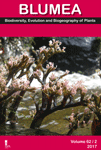
BLUMEA
Innovative insights driving biodiversity conservation.BLUMEA is a distinguished peer-reviewed journal published by RIJKSHERBARIUM in the Netherlands, specializing in Ecology, Evolution, Behavior and Systematics as well as Plant Science. With an ISSN of 0006-5196 and an E-ISSN of 0373-4293, this journal has established itself as a vital resource for academics and practitioners alike since its inception in 1993, with plans to continue through 2024. Currently holding a Q2 quartile ranking in both relevant categories, BLUMEA is positioned as a significant contributor to the advancement of knowledge in its fields, generating innovative research that informs sustainable practices and biodiversity conservation. Although it currently does not offer Open Access options, its insights are critical for those involved in plant sciences and ecological research. Positioned within the Scopus database, the journal ranks at the 41st percentile in Plant Science and the 39th percentile in Ecology, reflecting its substantial impact within the academic community. Researchers, students, and professionals who engage with BLUMEA will find it to be an indispensable source for high-quality research and valuable discussions aimed at shaping the future of ecological studies and botanical science.
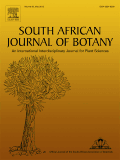
SOUTH AFRICAN JOURNAL OF BOTANY
Advancing Plant Science Through Rigorous ResearchThe SOUTH AFRICAN JOURNAL OF BOTANY, published by Elsevier, is a distinguished peer-reviewed journal that serves as an essential platform for the dissemination of high-quality research in the field of plant science. With an ISSN of 0254-6299 and an E-ISSN of 1727-9321, this journal has been a vital contributor to the scientific community since its inception in 1982, continuing to publish pivotal research findings up to 2024. Recognized in the Q2 category of Plant Science for 2023, and ranked 106 out of 516 in Scopus, this journal occupies the 79th percentile in its field, reflecting a strong commitment to advancing botanical sciences. Although it is not an open-access publication, it provides crucial insights and advancements that benefit researchers, professionals, and students alike. As the journal continues to evolve, it remains an invaluable resource for those dedicated to exploring the complexities of plant biology within the broader scope of agricultural and biological sciences.

BIOLOGY BULLETIN
Fostering Innovation in Biochemistry and Beyond.BIOLOGY BULLETIN is a prominent academic journal published by PLEIADES PUBLISHING INC, dedicated to advancing the fields of Agricultural and Biological Sciences as well as Biochemistry, Genetics, and Molecular Biology. With an ISSN of 1062-3590 and E-ISSN of 1608-3059, the journal has been a vital resource for researchers and professionals since its commencement in 1996. Located in the United States, BIOLOGY BULLETIN operates within a highly competitive academic landscape, achieving a 2023 ranking in the Q3 quartile for Agricultural and Biological Sciences and Q4 for Biochemistry, Genetics, and Molecular Biology, highlighting its commitment to delivering impactful research despite its challenges. Researchers seeking to publish their findings will find a platform for significant insights, as reflected in its Scopus rankings, where it stands at #183 and #199 out of 221 in its respective categories, showcasing opportunities for growth and visibility. While currently not an open-access publication, BIOLOGY BULLETIN plays a crucial role in facilitating scholarly communication and fostering an understanding of biological sciences, making it an essential read for academics, professionals, and students alike.